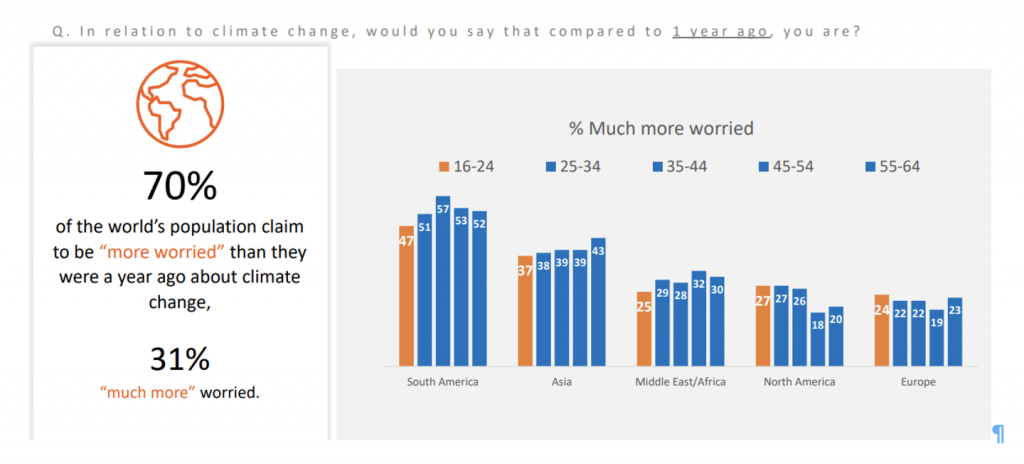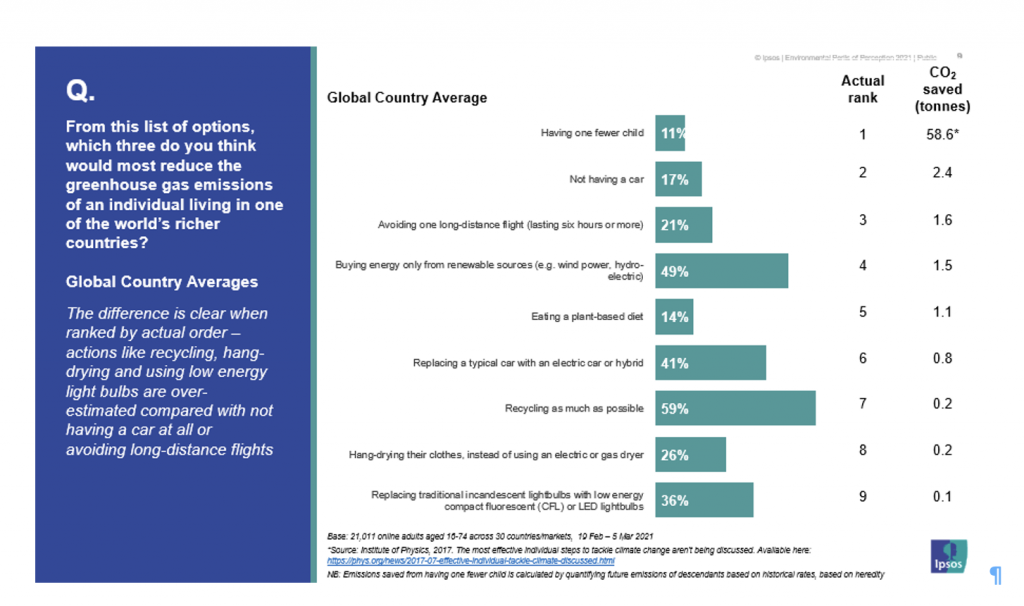Today’s post is by Jessica Long who is the Head of Sustainability and ESG Insights at Ipsos MORI. She leads a cross-sector transversal that oversees all the work Ipsos MORI does in the climate change, environment and wider ESG space. As ever, the views expressed in our blogs are not necessarily those of the Association.
Introduction
As the daunting headlines of floods, droughts, and wildfires have continued to intensify in recent months, one cannot help but wonder what the future holds for the health of our planet and its impact for human life as we know it. Even climate scientists are concerned how quickly the climate crisis is amplifying.1 Net Zero by 2050 increasingly feels far too late2 as the public demands greater government and industry leadership.3
It will undoubtedly be the younger generations that will live long enough to see the worst of this crisis, and it is therefore unsurprising that youth activists from around the world like Sweden’s Greta Thunberg, USA’s Xiuhtezcatl Martinez and India’s Licypriya Kangujam have become the outspoken voices in this movement, rallying youth across the planet to demand action.
Generational tensions around the climate change have long been noted, with the overarching narrative that young people feel frustrated as they are left to deal with the mistakes of older generations.4
But how differently do younger and older people truly feel, understand and act on the climate crisis? A closer look at the data suggests that any assumption that the climate crisis is specifically a ‘youth movement’ is inaccurate.
Concern about climate crisis not restricted to young people.
Global concern for the environment remains relatively equal across the age groups and continues to grow despite the pandemic, and the economic and wider socio-political unrest that have marked 2020.5 In Asia, South America, and the Middle East – 55-65 year olds claim to be ‘more worried’ about the climate crisis at the end of 2020 than the year prior compared to 16-24 year olds. In Europe, this figure is relatively the same between both age groups.6 See figure 1.

Figure 1. ‘More Worried’ than a year ago – Global 2020
The Believe-True Gap is true for all generations
Where the age discrepancy becomes slightly more apparent is in both the understanding of the issue and the most impactful actions to take to reduce carbon emissions.
While much has been said on the ‘say-do gap’ (or ‘values-action gap’), the difference between what people say vs what people actually do in this space, a more pressing issue that underpins behaviour change is the ‘believe-true’ gap. This is the disparity between what people believe vs what is actually true about the climate crisis.7
For example, younger people across the globe are only marginally more likely (35%) to know that more people are internally displaced by climate change instead of conflict than older generations (30%).8 There is also no significant difference between either age group in correctly identifying that the last six years have been the hottest on record.9 Overall, understanding of the issue appears relatively similar across both younger and older generations.
Younger people, however, are slightly more likely to understand what impactful actions to take compared to older generations. For example, they are twice as likely (14%) to identify ‘having a one fewer child’ as one of the top three most impactful actions you can take to reduce carbon emissions than older generations (7%).10 But only slightly less likely (53%) to inaccurately assume that recycling is amongst the top three most impactful actions you can take compared to older generations (62%).11 In general, the differences in understandings are not as vastly different as many may assume. Regardless of age, people tend to overestimate the least impactful actions and underestimate the most impactful actions.12 See figure 2.

Figure 2. Perceived top three most impactful actions to reduce carbon emissions – Global 2021
Younger people are slightly more likely to demand government leadership
The global public largely feel the responsibility of addressing the climate crisis should be fairly shared across government, industry and the general public.13 When it comes to specific actions taken, younger people are slightly more likely to put pressure on industry and government by attending protests and signing petitions compared to older generations.14 By comparison, older people are more likely to regularly recycle and assume a greater level of personal responsibility.15 Regardless, both generations ultimately feel they are pulling their own weight and demand greater government and industry leadership. Global data shows that concern for the environment is far more than a youth-led movement. In the months preceding the pandemic, this was the number one global value that united the world. Government and industry are remiss if they assume that the primary stakeholders of this movement are young people alone. We are already seeing the catastrophic human impacts of the climate crisis playing out in the headlines as floods, wildfires and record temperatures. The pandemic has only spurred this link, with majority of people globally believing that COVID-19 is in some way linked to our mistreatment of the planet.16 Government and industry do not just have a responsibility, but a mandate, to act quickly and efficiently. Debates over leadership and slow transitions to Net Zero by 2050 only stall the more urgent action that is required.
………………………………
Jessica can be contacted at Jessica.Long@ipsos.com
Notes
- https://edition.cnn.com/2021/07/20/world/climate-change-extreme-weather-speed-cmd-intl/index.html
- https://mronline.org/2020/11/16/scientists-say- net-zero-by-2050-is-too-late/
- Ipsos Earth Day Global Study 2021. https://www.ipsos.com/en/earth-day-2021-globally-public-ask-what-plan-tackle-climate-change
- https://thebulletin.org/2020/11/climate-change-meet-the-generation-gap/#:~:text=But%20a%20generational%20divide%20is,poll%20taken%20earlier%20this%20year.
- Ipsos & EDF Global Study 2020. https://www.edf.fr/en/opinions-observatory-global-warming-downloads
- Ipsos & EDF Global Study 2020. https://www.edf.fr/en/opinions-observatory-global-warming-downloads
- https://www.linkedin.com/pulse/climate-change-believe-true-gap-ben-marshall/
- Ipsos Perils of Perception of the Environment 2021. https://www.ipsos.com/ipsos-mori/en-uk/ipsos-perils-perception-climate-change
- Ipsos Perils of Perception of the Environment 2021. https://www.ipsos.com/ipsos-mori/en-uk/ipsos-perils-perception-climate-change
- Ipsos Perils of Perception of the Environment 2021. https://www.ipsos.com/ipsos-mori/en-uk/ipsos-perils-perception-climate-change
- Ipsos Perils of Perception of the Environment 2021. https://www.ipsos.com/ipsos-mori/en-uk/ipsos-perils-perception-climate-change
- Ipsos Perils of Perception of the Environment 2021. https://www.ipsos.com/ipsos-mori/en-uk/ipsos-perils-perception-climate-change
- Ipsos & EDF Global Study 2020. https://www.edf.fr/en/opinions-observatory-global-warming-downloads
- Ipsos & EDF Global Study 2020. https://www.edf.fr/en/opinions-observatory-global-warming-downloads
- Ipsos & EDF Global Study 2020. https://www.edf.fr/en/opinions-observatory-global-warming-downloads
- Ipsos & EDF Global Study 2020. https://www.edf.fr/en/opinions-observatory-global-warming-downloads
